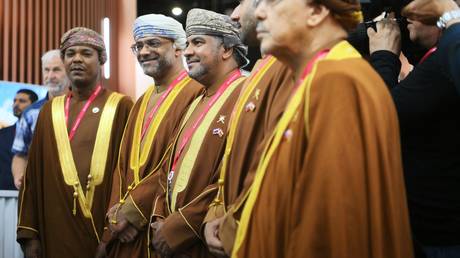
Mutual benefits and a shared vision for the world’s future make Moscow and the MENA states natural partners
The 27th annual St. Petersburg International Economic Forum (SPIEF) took place in Russia last week. As usual, representatives from Middle Eastern countries took active part in the event.
SPIEF is one of Russia’s key platforms for discussing global economic issues, attracting investments, and establishing business connections. Informally, this forum is often called the “Russian Davos.” Throughout its history, it has firmly established itself as a significant event for business leaders, politicians, and experts from around the world.
The forum was founded in 1997 and it has been held annually in St. Petersburg ever since. Initially, it was conceived as a regional platform for discussing the economic issues of the CIS countries, but over time, it has significantly expanded its horizons and become an international event. Since 2006, SPIEF has been held under the patronage and with the participation of the president of the Russian Federation, and in 2007, it gained international status, allowing it to attract even more participants from various parts of the world.
SPIEF remains an attractive platform for Middle Eastern countries. For instance, Qatar was granted the honorary status of guest country at the forum in 2021, followed by Egypt in 2022, and the UAE in 2023. In 2024, one of the honorary guests of the forum was the Sultanate of Oman, which concluded several important cooperation agreements with Russia, including agreements in the fields of IT and food production.
Oman as a SPIEF-2024 honorary guest
Oman’s status as a SPIEF-2024 guest country is unsurprising, as the country’s relations with Russia are based on mutual respect and benefit, and continue to strengthen each year. Muscat aims to elevate its relations with Russia to the level of a strategic partnership, which will be an important step in enhancing the economic and political ties between the two countries.
Economic cooperation between Russia and Oman is of great significance to both parties. At the forum, they signed several agreements. Russia views Oman as a promising partner and a gateway to the Gulf countries’ market, estimated at $2 trillion, according to Economic Development Minister Maksim Reshetnikov. This region offers tremendous opportunities for Russian businesses and investments. In particular, the Russian online retailer Wildberries is exploring the possibility of starting operations in Oman. The Gulf countries, especially Oman, can become an ideal place for expanding e-commerce, as there are virtually no strong players in the market, noted Wildberries CEO Tatyana Bakalchuk.
Additionally, following SPIEF-2024, the Russian IT developer Group Cifra signed an agreement to supply its solutions to Oman, including those for the sultanate’s oil and gas industry. This agreement opens new horizons for technological cooperation and innovation, which is of great importance to both countries.
Russia and Oman also agreed to develop food cooperation. Oman Food Investment Holding expressed an interest in importing Russian fruit and vegetables, as well as increasing grain supplies from Russia. In 2023, the trade volume of grain between Russia and Oman amounted to about $50 million. Increasing food supplies will be an important aspect of strengthening economic ties between the countries.
Both countries are interested in forming a new world order that will improve international security. Both states actively advocate for a multipolar world where the interests of various countries are considered and balanced. Strengthening cooperation between Russia and Oman in this direction will serve as an important contribution to creating a stable and secure international environment.
The interaction between Russia and Oman has significant potential for growth and development. Muscat’s desire for a strategic partnership with Moscow is an important step in this direction. Economic cooperation, participation in major international forums, the development of food and technological projects, as well as joint efforts to form a new world order are key elements of this process. Both countries have every chance for successful and mutually beneficial cooperation in various fields, as demonstrated by the representative delegation of officials and business circles from Oman at SPIEF 2024.
Why do Middle Eastern countries love SPIEF so much?
This year, the forum saw the participation of 21,300 delegates and guests from 139 countries, reported Anton Kobyakov, Advisor to the President of the Russian Federation and Executive Secretary of the SPIEF Organizing Committee. The largest delegation this year came from China, with 192 participants, followed by the United Arab Emirates with 105 participants, and Zimbabwe with 86. The top five also included Kazakhstan with 84 delegates and India with 80. Oman sent a delegation of 75 participants. Additionally, representatives from other Middle Eastern countries such as Bahrain, Qatar, Saudi Arabia, Egypt, Türkiye, Iran, and others attended the forum.
The significant interest of Middle Eastern countries in the economic forum is undoubtedly driven by the intensification of business ties. The trade and economic relations between Russia and the countries of the Middle East and North Africa (MENA) continue to strengthen, showing significant growth in recent years. In 2023, the trade turnover between Russia and the MENA countries reached $50 billion, which is 20% higher than what it was the previous year. The most significant areas of cooperation are energy, agriculture, infrastructure, and technology. The countries in the region, which possess significant natural resources and are striving to diversify their economies, see Russia as a strategic partner capable of offering advanced technology, experience, and investment. Mutual interest in developing trade ties facilitates the conclusion of major contracts and agreements, as evidenced by numerous business forums and high-level visits.
Energy remains the main area of cooperation, with Russian companies such as Gazprom and Rosneft working on oil and gas extraction and processing projects in the MENA countries. In 2023, the volume of Russian oil exports to the region amounted to 25 million tons, which is 15% more than the previous year. In turn, the countries in the region invest in Russian energy projects and infrastructure, spending more than $10 billion in 2023. Besides energy, cooperation is developing in agriculture, where Russia supplies grain, vegetables, and fruits. In 2023, the volume of Russian grain exports to the MENA countries amounted to 10 million tons, covering about 15% of the region’s grain needs. Trade and economic ties are supported by bilateral investments in construction, transport, and information technology. The volume of investments in Russian infrastructure projects from the MENA countries amounted to $5 billion in 2023, promoting closer economic integration and sustainable development of relations between Russia and the MENA countries.
However, the “Russian Davos” is also interesting because political issues that concern the elite from the MENA countries are discussed in its corridors.
“Big War will be the greatest catastrophe” – such words are increasingly heard in private conversations on the sidelines of the St. Petersburg International Economic Forum. Participants are deeply concerned about the possibility of a large-scale war involving nuclear weapons. Everyone understands that no one desires a global conflict, but they also recognize that the confrontation between the West and Russia, and China as well, is only growing, with no visible opportunities for de-escalation. Countries such as Türkiye, the UAE, Saudi Arabia, and Qatar, along with other states of the region, are trying their best to facilitate the resolution of the Ukrainian conflict. Many note that the West’s unwillingness to understand Moscow’s concerns and interests led to the start of the Special Military Operation (SMO) in Ukraine, and this factor continues to hinder conflict resolution.
Closer to the region, Israel and Palestine present a tragedy that the international community is watching helplessly. With each discussion, it becomes clearer that regional players understand that the West never seriously sought to resolve the conflict by creating two states for two peoples. There have always been geopolitical games played by the US and the UK, which did not consider the interests of the conflicting parties and were not aimed at ensuring security and political stability in the Middle East. Many foreign forum participants welcome the Russian position and understand that real help in resolving the conflict can only come from the “collective non-West.”
The seizure of Russian assets is another hot topic at SPIEF. Foreign participants note that Western countries are undermining established rules and norms with their actions, plunging the world into even greater uncertainty and chaos. Many of them are quietly withdrawing their funds from Western economies, indicating growing distrust and the search for new financial havens.
All you need is BRICS
BRICS is perhaps the most frequently discussed topic in the corridors of the forum. Discussions revolve around what needs to be done to strengthen the organization, the necessary steps, and why it is important. Everyone agrees that BRICS should not only expand by including new countries but also develop internal mechanisms of interaction. The world is changing, and alternative international structures are needed to form the basis of new norms and orders.
Middle Eastern countries are showing growing interest in BRICS, seeing in this union an opportunity to strengthen their economic and political positions on the global stage. States such as Saudi Arabia, the UAE, Egypt, and Iran were invited to join the organization starting January 1, 2024. Additionally, in 2023, official applications for BRICS membership were submitted by Algeria, Bahrain, Kuwait, Morocco, and the State of Palestine. Recently, Turkish Foreign Minister Hakan Fidan announced his country’s intention to join BRICS, which is why he attended the BRICS Foreign Ministers Council in Nizhny Novgorod, Russia, on June 10-11.
The participation of Middle Eastern countries can significantly contribute to the development of BRICS, given their rich natural resources and strategic location. The inclusion of new members from the MENA region could help create a more balanced and multipolar international system, ultimately strengthening global stability and security.
This sentiment was echoed by Russian President Vladimir Putin during his speech at the SPIEF-2024 Plenary Session. The Russian leader began by noting the race among countries to strengthen their sovereignty on three levels: state, cultural, and economic. He emphasized that China has the largest GDP (PPP) in the world, and India ranks third. Both of these countries, along with Russia, were among the founders of BRICS, which is now actively expanding with new interested countries.
“I am confident that both in the current conditions and in the long term, the role, weight, and, more importantly, the future of states depend on how effectively they can respond to global challenges, realize their internal potential, utilize their competitive advantages, mitigate weaknesses, and maintain and strengthen partnerships with other countries,” said Putin.
He also noted that Russia is expanding the geography of its exports and imports, and developing trade with those ready for it. The country is open to cooperation on mutually beneficial terms, and the results show that Russia’s partners adhere to a similar approach. In particular, three-quarters of Russia’s trade turnover now comes from friendly countries. Its volume of trade increased from 2020 to 2023 with Asian countries (60%), African countries (69%), and Latin America (42%); it doubled with the nations of the Middle East during that period.
Given the above, it becomes clear why there is such a high level of interest from Middle Eastern players in the St. Petersburg forum. The world is changing significantly, and Moscow has many points of convergence and common visions with MENA countries, which are dissatisfied with the existing norms of the international economic and political order.
SPIEF-2024 confirmed the forum’s status as an important international platform for dialogue and cooperation. The forum continues to play a key role in shaping the global economic agenda and establishing international business contacts, increasingly attracting participants from the “global majority” countries.




